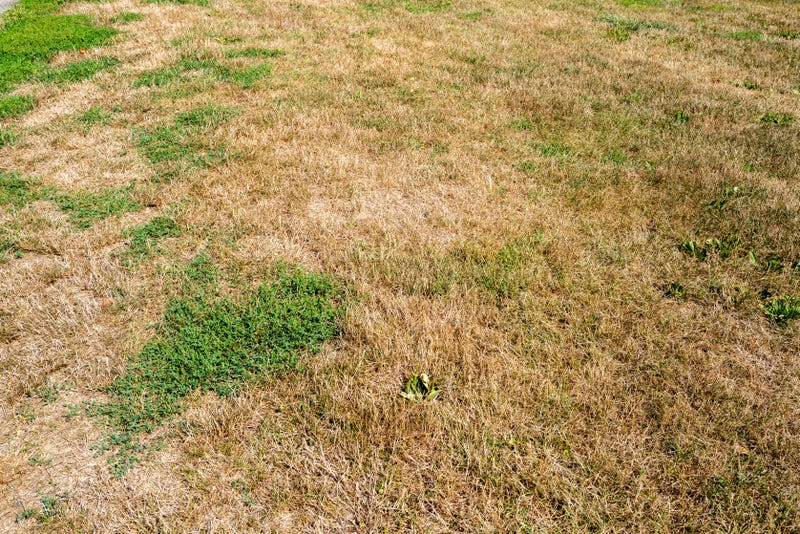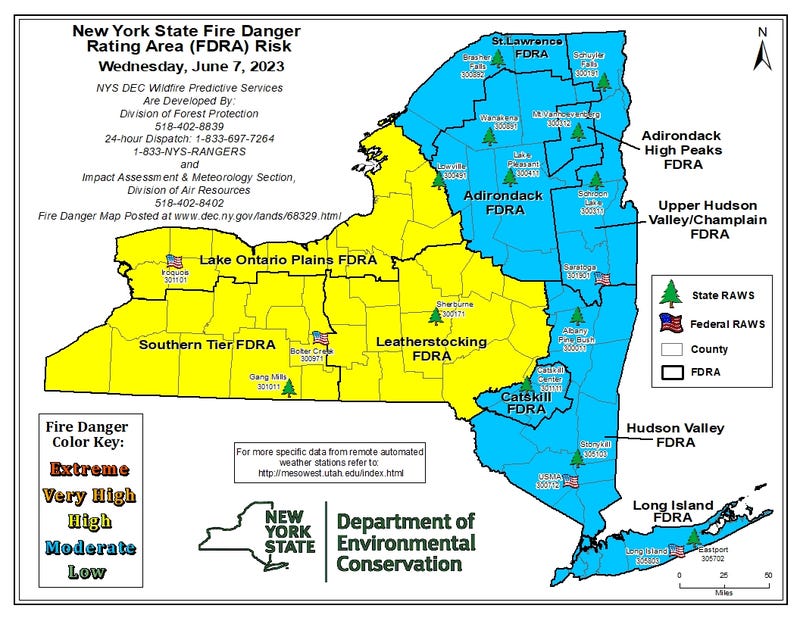
(WBEN) - Over the last few days, smoke drifting South from forest fires in Quebec have created some unhealthy air quality levels across New York State, with Western New York facing lower levels of air pollutants compared to areas like the Finger Lakes, Central New York and into the Downstate area.
According to reports, many of the fires in Quebec were started days, if not weeks ago by lightning strikes, with dry conditions and above normal temperatures providing the right conditions to fuel and spread the fires.
However, a lack of precipitation in Western New York has recently raised concerns throughout the region with very dry conditions heightening potential fire dangers.
According to the National Weather Service, much of the area has seen less than an inch of precipitation over the last 30 days. Much of Western New York has not seen any rainfall within a 14-day period.
LISTEN LIVE TO WBEN:
While Western New York is not at a point Canada has been with drier conditions to set up the right conditions for these wildfires, it is a situation the New York State Department of Environmental Conservation (DEC) is monitoring very closely.
"It has been very dry, it's been hot in some places, windy in some places. We're on alert statewide," said DEC Commissioner Basil Seggos during an appearance with Susan Rose on WBEN on Wednesday. "We've got our firefighters within DEC, we're talking closely with state fire, as well as local fire departments about those kinds of conditions. And urging people because of those dry categories the state's in right now to just limit burning of debris outside or any uncontained campfires, because that can then trigger these kinds of blazes that get out of control quickly."
Locally in Erie County, discussions are mostly being held within agencies of a town or a village fire department, fire districts with regard to any potential fire dangers, and more or less monitoring potential issues.
"I know fire departments over the last week or so have had an uptick with grass fires and some brush fires as a result of these dry conditions that we've had. It's dry, there's no humidity, there hasn't been rain now in many, many weeks. It's definitely something everybody needs to be aware of," said Dan Neaverth Jr., Commissioner of Erie County Emergency Services.
One local municipality that has recently dealt with a rash of fires as a result of the drier conditions in the region is the Village of Springville. Springville Fire Chief Marc Gentner says the dry conditions have become a heightened concern for him with potential fire issues.
"I'm very surprised they haven't reinstated a burning ban in the state," said Gentner in an interview with WBEN. "We had an incident where some people were doing some burning and fireworks, and it got out of hand. It started two separate fires, one got into a structure and one into the woods behind an apartment house right here in the village. Last weekend, we had a fire on the 219 Expressway probably started by a cigarette butt getting thrown out the window. But I don't know, some people just continue to burn. It just doesn't make any sense to me. One gust of wind, and you've got a major fire going.
"We had another fire in the village. They were just having a campfire, it was a little windy. They did have it in a ring, and it got outside the ring and took off. There's probably a quarter of an acre that we're lucky we got there quick and got it extinguished. But you've got to be real careful right now. Until we get some rain, I wouldn't recommend anybody starting anything."
According to the New York State DEC, the fire danger rating for Western New York and through Central New York and into the Southern Tier is listed at a high level of fire danger. Neaverth Jr. says that means if you're having a recreational fire, just be aware of your surroundings.
"You need to be aware there might be green grass, but underneath that, there's quite a bit of dry, dead grass. And with humidity levels with being as low as they are right now, everything is just ripe to spread beyond that campfire," he said.

While some concerns may arise of there being an elevated risk for the region with wildfires or forest fires, similar to what's burning in Quebec, Neaverth Jr. says there has been no indications of there being conditions so dry to have a forest fire generated. However, conditions are certainly right to see grass and brush burning out in a lot of spots.
Although Western New York is not a common place to find wildfires or forest fires starting and spreading, there are differing degrees of preparation that goes into battling smaller blazes such as a grass fire or brush fire.
"At the county level, we just work with assisting in the event there was a large brush fire, which we have them several times throughout the course of the year," Neaverth Jr. said. "We have some limited equipment. The fire departments that have had a history of brush fires and large grass fires also have some specialized equipment, things that can get to those hard to get places - ATVs, UTVs. Many of them actually have the ATVs or UTVs that are capable of carrying water to the source, but you're attacking it a little bit different.
"If it's a grass fire, you're trying to extinguish it as much as possible, but you're actually taking the leading edge of that, and you're pushing it into the area that's already been burned. By the minute, it doubles in size in a lot of cases. So it's a matter of having the equipment that can get to the remote areas where we have, or tend to have these brush fires or these grass fires."
Meanwhile in Springville, Gentner says their brush fighting equipment is ready to go at all times, and they also have been ready to assist with other companies calling on a whims notice.
"One of the biggest concerns we have when it's 90 degrees and you're out there in your gear, fighting the brush fire, it takes a big toll on on the firemen. It's dangerous, you get a chance for heat exhaustion. That's not good either way you look at it," Gentner said.
If conditions for a brush fire do happen to get worse with the right conditions, causing a blaze to spread across several acres of land, Gentner says local fire companies and mutual aid companies are willing and ready to go.
At the county level, Neaverth Jr. says they have the ability to acquire and find any resources necessary to help battle a larger fire. This is especially the case for those fire departments that don't have the right equipment to battle the larger brush fires.
"We've all seen what goes into a forest fire, and the individuals that do that - mostly out West and in Western Canada - when they're dealing with that, you're not wearing traditional turnout gear, you're not wearing air packs. In many cases, during a forest fire, you're not even using water on it. What you're doing is you're more of a sawyer crew, where you're cutting things down, you're removing excess vegetation. So it's a whole different operation," Neaverth Jr. said. "It's not something the local fire departments are equipped to do, and that's why when you see these one-off situations where there's a forest fire there's never been before, you utilize your resources, we contact the state, the state has the resources to be able to assist with that. But oftentimes, it's a national effort, so we work through the chain and would then get additional resources as required."
So what messages do Gentner and Neaverth Jr. have for residents in the coming days with conditions expected to stay relatively dry across the region? Gentner says hold off on trying to burn anything until some precipitation comes our way.
"It's just so dry right now, one spark is all it takes, a cigarette butt, anything," he said. "You go to these functions, flea markets that are set up in the fields, you get somebody smoking a cigarette, drop it on the grass, and it's instant, it's going. It's just a bad situation right now until we get some rain."
As for Neaverth Jr., he says it's all about using common sense when conditions are favorable for elevated fire dangers outdoors.
"This time of year, the weather's nice, beautiful. We have this beautiful weather out there, relatively - up until recently - clear skies, but everything is very dry. And despite all of the rain that we had in the spring, things are drying out fairly quickly, rapidly approaching drought conditions in a lot of areas," he said. "If you're going to have a campfire, make sure that you have backup water to be able to put it out when you're done. Make sure the fire is out at the end of the night when you're done with your little campfire there. But also keep in mind, a lot of people like to try and burn major brush and whatnot this time of year. It's not the time of year to do it, because the embers can travel quite easily, just a little bit of a breeze. It might not even be within eyesight of your fire, but it can very easily escalate into a much larger fire situation. It's maybe delaying that family bonfire or whatever you are planning on having for a couple of weeks.
"We do have rain on the horizon, and we'll get back to those normal damp conditions where it's not as much of a concern."

